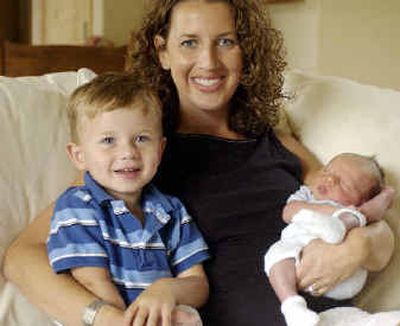Health notes

When Ronni Collins was young, she worried she wouldn’t be able to have children. She endured five years of periodic chemotherapy and spinal taps after she was diagnosed at age 3 with acute lymphocytic leukemia.
Now 30 years old, Collins is the mother of two boys: Bailey, age 2, and Carter, who was born Aug. 5 at Deaconess Medical Center.
That’s the same hospital where Collins received most of her treatment from Dr. Frank Reynolds, founder of Deaconess’ children’s cancer program.
“I remember being in the hospital, having shots in my back and hugging Dr. Reynolds every time afterward,” Collins said last week, relaxing at her home in Spokane and holding her new baby.
In those days, children with acute lymphocytic leukemia had about a 50-50 chance of beating cancer and living out a normal lifespan, said Dr. Steven Bergstrom, a children’s cancer specialist who now works with Reynolds at Deaconess.
“We weren’t offering a lot of hope to those kids,” said Bergstrom, who has been practicing almost 25 years. “It was guarded optimism at best. We weren’t even talking about fertility.”
Today, nine out of 10 patients with ALL are expected to survive and live normally, he said.
“Today we have very frank discussions about fertility” with young patients, he said. In fact, he’s treated two adolescent girls who became pregnant during treatment.
Bergstrom said teenage boys in treatment are informed they can freeze sperm samples before chemotherapy. That information is important because it’s likely the boys will survive, grow up and want to be fathers.
“I tell them specifically they will grow up and have children,” Bergstrom said.
Why the big improvement in prognosis for leukemia? The answer is care that’s based on scientific evidence and is standardized across the country, Bergstrom said.
“It’s not new drugs and the drugs are not given in different ways,” Bergstrom said. It’s adherence to science-driven treatment protocols that has improved kids’ chances. “If you’re treated for ALL in Spokane, you get the same treatment you would get in Washington, D.C., in Houston, in San Francisco, in every center in the country.”
Despite more difficult odds in the old days, Dr. Frank Reynolds gave patients and their families hope, said Ronni Collins’ mother, Suzanne Weiand.
“He told me he would dance at Ronni’s wedding,” Weiand said, “and he did.”
Ronni Weiand grew up and married someone who loved medicine, Dr. Chad Collins, an oral and maxillofacial surgeon. Becoming a mother herself gave her a deeper sense for the worry her parents went through when she was sick.
“I thought the world was ending when Bailey had to have ear tubes,” she said.
Drugs added
Medicare is adding two more medications to the list of drugs covered in the so-called Medicare lottery. The lottery is a demonstration program that gives discount prices to a select group of Medicare beneficiaries.
The new drugs are Somavert for treatment of acromegaly, a hormonal disorder, and Mesnex tablets, used to prevent side effects of certain kinds of chemotherapy.
Patients must submit a lengthy application by Sept. 30, including a portion signed by their doctor. A random drawing will determine who gets the coverage. Those accepted will begin getting benefits by Oct. 18.
For more information, call (866) 563-5386, or by TTY at (866) 536-5387.
Last year’s Medicare Modernization Act set aside $500 million to help 50,000 people pay for certain drugs that can be administered at home. The newer “niche drugs” for cancer, MS, rheumatoid arthritis, hepatitis C and other serious illnesses will be covered at rates from 75 percent to 90 percent.